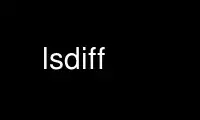
This is the command lsdiff that can be run in the OnWorks free hosting provider using one of our multiple free online workstations such as Ubuntu Online, Fedora Online, Windows online emulator or MAC OS online emulator
PROGRAM:
NAME
lsdiff - show which files are modified by a patch
SYNOPSIS
lsdiff [[-n] | [--line-number]] [[-p n] | [--strip-match=n]] [--strip=n]
[--addprefix=PREFIX] [[-s] | [--status]] [[-E] | [--empty-files-as-removed]]
[[-i PATTERN] | [--include=PATTERN]] [[-x PATTERN] | [--exclude=PATTERN]] [[-z] |
[--decompress]] [[-# RANGE] | [--hunks=RANGE]] [--lines=RANGE] [[-FRANGE] |
[--files=RANGE]] [[-H] | [--with-filename]] [[-h] | [--no-filename]] [[-v] |
[--verbose]...] [file...]
lsdiff {[--help] | [--version] | [--filter ...] | [--grep ...]}
DESCRIPTION
List the files modified by a patch.
You can use both unified and context format diffs with this program.
OPTIONS
-n, --line-number
Display the line number that each patch begins at. If verbose output is requested
(using -nv), each hunk of each patch is listed as well.
For each file that is modified, a line is generated containing the line number of the
beginning of the patch, followed by a Tab character, followed by the name of the file
that is modified. If -v is given once, following each of these lines will be one line
for each hunk, consisting of a Tab character, the line number that the hunk begins at,
another Tab character, the string “Hunk #”, and the hunk number (starting at 1).
If the -v is given twice in conjunction with -n (i.e. -nvv), the format is slightly
different: hunk-level descriptive text is shown after each hunk number, and the
--number-files option is enabled.
-N, --number-files
File numbers are listed, beginning at 1, before each filename.
-# RANGE, --hunks=RANGE
Only list hunks within the specified RANGE. Hunks are numbered from 1, and the range
is a comma-separated list of numbers or “first-last” spans, optionially preceeded by a
modifier 'x' which inverts the entire range; either the first or the last in the span
may be omitted to indicate no limit in that direction.
--lines=RANGE
Only list hunks that contain lines from the original file that lie within the
specified RANGE. Lines are numbered from 1, and the range is a comma-separated list of
numbers or “first-last” spans, optionially preceeded by a modifier 'x' which inverts
the entire range; either the first or the last in the span may be omitted to indicate
no limit in that direction.
-F=RANGE, --files=RANGE
Only list files indicated by the specified RANGE. Files are numbered from 1 in the
order they appear in the patch input, and the range is a comma-separated list of
numbers or “first-last” spans, optionially preceeded by a modifier 'x' which inverts
the entire range; either the first or the last in the span may be omitted to indicate
no limit in that direction.
-p n, --strip-match=n
When matching, ignore the first n components of the pathname.
--strip=n
Remove the first n components of the pathname before displaying it.
--addprefix=PREFIX
Prefix the pathname with PREFIX before displaying it.
-s, --status
Show file additions, modifications and removals. A file addition is indicated by a
“+”, a removal by a “-”, and a modification by a “!”.
-E, --empty-files-as-removed
Treat empty files as absent for the purpose of displaying file additions,
modifications and removals.
-i PATTERN, --include=PATTERN
Include only files matching PATTERN.
-x PATTERN, --exclude=PATTERN
Exclude files matching PATTERN.
-z, --decompress
Decompress files with extensions .gz and .bz2.
-H, --with-filename
Print the name of the patch file containing each patch.
-h, --no-filename
Suppress the name of the patch file containing each patch.
-v, --verbose
Verbose output.
--help
Display a short usage message.
--version
Display the version number of lsdiff.
--filter
Behave like filterdiff(1) instead.
--grep
Behave like grepdiff(1) instead.
Use lsdiff online using onworks.net services